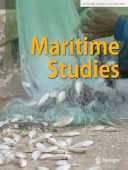Maritime studies
Abbreviation:
Maritime Stud.
Published by:
Holtzbrinck Springer Nature Publishing Group
Publisher Location: Dordrecht, Netherlands
Journal Website:
https://link.springer.com/journal/40152/volumes-and-issues
Range of citations in the SafetyLit database:
2022; ePub(ePub) --
2022; ePub(ePub)
Publication Date Range:
1994 --
Number of articles from this journal included in the SafetyLit database:
1
(Download all articles from this journal in CSV format.)
pISSN = 1872-7859 | eISSN = 2212-9790
Find a library that holds this journal: http://worldcat.org/issn/18727859
Journal Language(s):
English
Title preceded by:
Maritime anthropological studies
Aims and Scope (from publisher):
Maritime Studies (or MAST) is an interdisciplinary, international journal devoted to maritime issues and is a sequel to Maritime Anthropological Studies, which appeared between 1988 and 1993. MAST has a social science focus, but functions as a platform for scholars from a broad range of disciplines who are engaged in research on maritime and coastal matters, from an academic or applied point of view.
MAST is supported by MARE (Center for Maritime Research), an interdisciplinary social-science institute studying the use and management of marine resources. Its objective is to provide a stimulating intellectual climate for academics and policymakers in Europe as well as in the South. Although MARE limits its action radius to the social sciences, it seeks active collaboration with other disciplines. It strives to maintain a balanced mix of academic and policy-oriented research. MARE takes a global perspective, emphasizing the coastal zones of Europe, the Americas, Asia, and Africa. It covers a broad spectrum of topics, drawing on expertise from fields such as law, history, economics, political science, public administration, anthropology, and geography.
